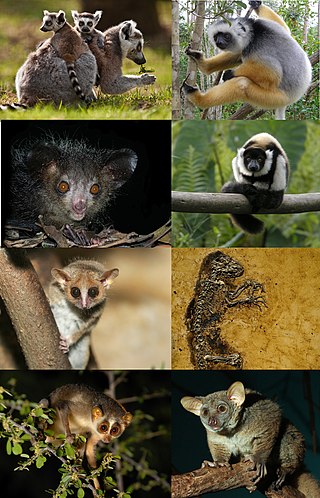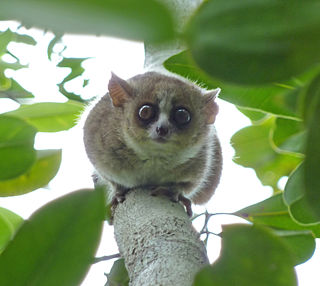
Lorisidae is a family of strepsirrhine primates. The lorisids are all slim arboreal animals and comprise the lorises, pottos, and angwantibos. Lorisids live in tropical, central Africa as well as in south and southeast Asia.

Perodicticinae is a subfamily of the family Lorisidae. It includes five species of African primates as shown under taxonomy below.

Strepsirrhini or Strepsirhini is a suborder of primates that includes the lemuriform primates, which consist of the lemurs of Madagascar, galagos ("bushbabies") and pottos from Africa, and the lorises from India and southeast Asia. Collectively they are referred to as strepsirrhines. Also belonging to the suborder are the extinct adapiform primates which thrived during the Eocene in Europe, North America, and Asia, but disappeared from most of the Northern Hemisphere as the climate cooled. Adapiforms are sometimes referred to as being "lemur-like", although the diversity of both lemurs and adapiforms does not support this comparison.

Haplorhini, the haplorhines or the "dry-nosed" primates is a suborder of primates containing the tarsiers and the simians, as sister of the Strepsirrhini ("moist-nosed"). The name is sometimes spelled Haplorrhini. The simians include catarrhines, and the platyrrhines.

Angwantibos are two species of strepsirrhine primates classified in the genus Arctocebus of the family Lorisidae. They are also known as golden pottos because of their yellow or golden coloration.

Lemuriformes is the sole extant infraorder of primate that falls under the suborder Strepsirrhini. It includes the lemurs of Madagascar, as well as the galagos and lorisids of Africa and Asia, although a popular alternative taxonomy places the lorisoids in their own infraorder, Lorisiformes.

The pottos are three species of strepsirrhine primate in the genus Perodicticus of the family Lorisidae. In some English-speaking parts of Africa, they are called "softly-softlys".

Slow lorises are a group of several species of nocturnal strepsirrhine primates that make up the genus Nycticebus. Found in Southeast Asia and nearby areas, they range from Bangladesh and Northeast India in the west to the Sulu Archipelago in the Philippines in the east, and from Yunnan province in China in the north to the island of Java in the south.
Softly, Softly may refer to:

Lorisoidea is a superfamily of nocturnal primates found throughout Africa and Asia. Members include the galagos and the lorisids. As strepsirrhines, lorisoids are related to the lemurs of Madagascar and are sometimes included in the infraorder Lemuriformes, although they are also sometimes placed in their own infraorder, LorisiformesGregory, 1915.

The Calabar angwantibo, also known as the Calabar potto, is a strepsirrhine primate of the family Lorisidae. It shares the genus Arctocebus with the golden angwantibo. It is closely related to the potto and to the various lorises.

The golden angwantibo is a strepsirrhine primate of the family Lorisidae. It shares the genus Arctocebus with the Calabar angwantibo and together they are commonly called the golden pottos. The golden angwantibo is found in Cameroon, the Republic of Congo, Equatorial Guinea and Gabon. Its usual habitat is rain forest, but it has also been known to live on farmland.
The false potto is a lorisoid primate of uncertain taxonomic status found in Africa. Anthropologist Jeffrey H. Schwartz named it in 1996 as the only species of the genus Pseudopotto on the basis of two specimens that had previously been identified as a potto (Perodicticus). The precise provenances of the two specimens are uncertain, but at least one may have come from Cameroon. Schwartz thought the false potto could even represent a separate family, but other researchers have argued that the supposed distinguishing features of the animal do not actually distinguish it from the potto; specifically, the false potto shares several features with the West African potto.
Poto or POTO may refer to:

Lemurs, primates belonging to the suborder Strepsirrhini which branched off from other primates less than 63 million years ago, evolved on the island of Madagascar, for at least 40 million years. They share some traits with the most basal primates, and thus are often confused as being ancestral to modern monkeys, apes, and humans. Instead, they merely resemble ancestral primates.
Propotto is an extinct monotypic genus of strepsirrhine primate from the early Miocene of Kenya. It contains one described species, Propotto leakeyi. Although long considered a pteropodid fruit-eating bat after spending a brief sojourn as a prehistoric relative of lorises, recent research shows it to be an extinct relative of the aye-aye.

The West African potto is a species of nocturnal strepsirrhine primate. It is found in tropical West Africa. It is also known as Bosman's potto, after Willem Bosman, who described the species in 1704. It is the type species of the genus Perodicticus.

The Central African potto is a species of nocturnal strepsirrhine primate. It is found in Central Africa. It is also known as Milne-Edwards's potto, after Alphonse Milne-Edwards.

The East African potto is a species of nocturnal strepsirrhine primate. It is found in Central and East Africa.
This page is based on this
Wikipedia article Text is available under the
CC BY-SA 4.0 license; additional terms may apply.
Images, videos and audio are available under their respective licenses.












